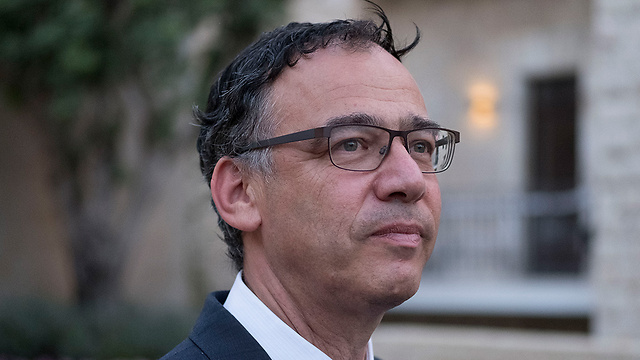
AG opposes anti-police recommendations bill
Mandelblit opposes bill prohibiting police from presenting indictment recommendations, despite the fact police currently only states whether it has found sufficient evidence to justify indictment.
Senior officials at the state attorney's office, including the attorney general himself, voiced their opposition Thursday evening against a bill that would prohibit the police from presenting a recommendation to indict. This despite the fact that the police does not, actually, recommend indictment, but rather states whether it has found sufficient evidence to justify an indictment.
"We oppose the bill—both in terms of content and timing, which is not right," Attorney General Avichai Mandelblit said, speaking on behalf of the state attorney's office moments before enetering its offices ahead of a conference.
"I will present my position to the government," he concluded.
At the conference, many sided with the AG and his position on the Bill.
State Prosecutor Shai Nitzan unequivocally supported Mandelblit opinion, saying that "the public must understand that the police and the State Prosecutor's Office are working hand in hand, and if they want justice done, the dialogue between them must be allowed.
It is very important to hear the opinion of the investigator in a case. A law that would prevent the State Attorney's Office from receiving recommendations in 30,000 cases would cause legal torture and harm to the public.
"Preventing a person who investigated a case from voicing his opinion on it is definitely problematic. This will prolong investigations and will require many more hours of work."
"It is my duty and obligation to say what I think about the proposal, how it will affect the work of the police, and in my opinion it will create many difficulties and impair the efficiency of their work," Nitzan added. "Our job is to bring justice to light and we need to be given the tools to do our work, not for our own good but for the benefit of the entire public."
Dorit Beinisch, former president of the Supreme Court, added at the conference that "the matter of police recommendations is the basis for any work on a criminal case, and a criminal case comes with a summary of an investigation and a position taken.
"It is hard for me to see how the prosecution works when it does not have the police material with the summaries and the recommendations.
"Why is this law important? Is it essential?"
Despite the objections of the attorney general, the state prosecutor and Police Commissioner Roni Alsheich, the controversial bill is expected to pass through the Ministerial Committee on Legislation on Sunday.
The bill—pitched by Dudu Amsalem (Likud)—in its original draft forbade the police from investigating a sitting prime minister for sex, violence, security and drug offenses until the remainder of their term, as a way to alleviate pressures on him caused by worsening public opinion and coalition distrust, which allegedly hinder his ability to govern and could be brought on by political adversaries.
The bill's current draft forbids the police from recommending to the State Attorney's Office to file an indictment against any suspect, limiting them to present only the findings against him. This new version, though, would also have the law apply to current police investigations against Prime Minister Benjamin Netanyahu. These include the illicit gifts investigation, his alleged attempts to sway his media coverage through talks with Yedioth Ahronoth owner Noni Mozes, Netanyahu's alleged push for the Israeli Navy to purchase several German submarines and suspected forgery of meal expenses submitted by the prime minister and his wife, Sara.
According to the current proposal, an interrogator who deviates from the directive may face a prison term of up to one year.












